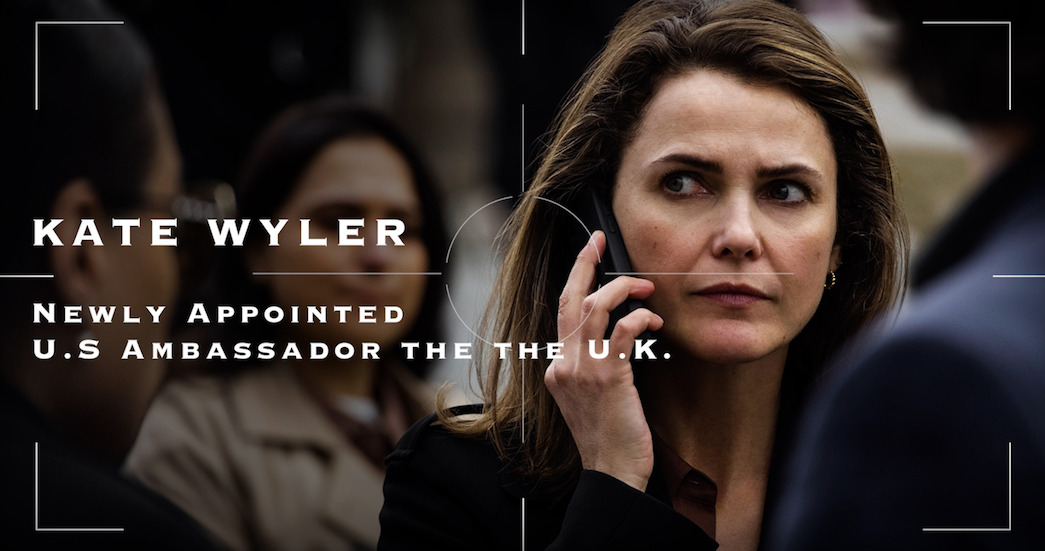“I always knew that I wanted to do something about who we are in the world.”
You know Debora Cahn’s name. You’ve seen it rolling in the credits of The West Wing, Homeland, Grey’s Anatomy, and many more beloved television dramas where she served as writer and producer. But now she has a new title: creator. Her just-dropped series The Diplomat, is a high-stakes, contemporary political drama about the transcendence and torture of long-term relationships, between countries and people. Here she speaks with musician and podcast creator Hrishikesh Hirway (who co-hosted the West Wing Weekly podcast) about coming up as a screenwriter, the “dream” of working with star Keri Russell, and why ambassadors are actually superheroes.
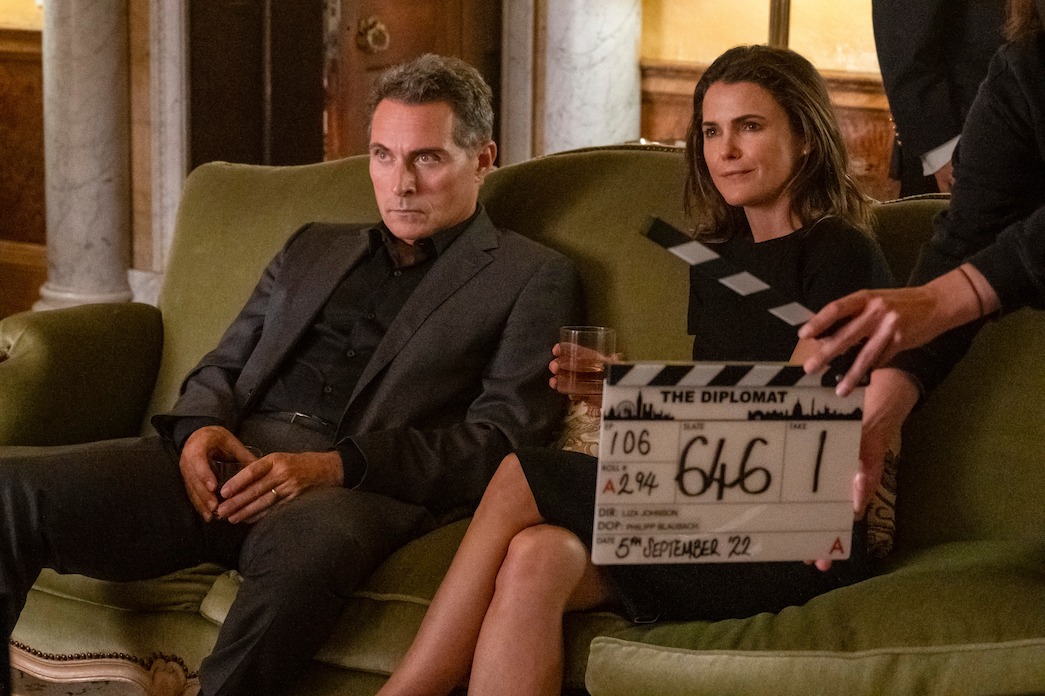
Alex Bailey/Netflix
Do you remember the very first instinct you had that made you want to create this show?
The first was sitting in my office at the West Wing when I knew the series was ending, and I was like, “Well, I want to do this—but international.” And I spent a lot of time thinking about what that might mean. And I was like, “Well, maybe it’s set in an embassy.” And I always knew that I wanted to do something about who we are in the world. And I felt like 10 years after West Wing I went and worked on Homeland and I got it. And it was great.
I would talk to people about Homeland and people often said, “Oh, I love that show, but it’s so intense.” It’s emotionally intense. It’s tough material. And there was a moment when we were filming a scene in Morocco on the roof of a sort of a bombed out building. And we’re shooting this scene where Claire Danes and Mandy Patinkin are having an argument. And I watched the scene and I remember thinking, “There’s nothing in this conversation that they’re having, this argument that they’re having with each other about what the CIA should or shouldn’t be doing that couldn’t happen on the set of The Crown. And we would be more comfortable than we are on this roof and the audience would be a little bit more comfortable. Is there a way to give it a little bit of “location porn” to make it all go down a little bit easier, to give it a little bit of a fantasy element?”
And the people that I knew at that point, who had done those kinds of jobs, you’re in your life in the U.S., maybe you’re in politics, maybe you work for the State Department, and suddenly you get posted somewhere, and you’re living in a palace. It just is a palace. And now, that’s where you and your teenagers and your socks that are sweaty all are.
RELATED STORIES
-
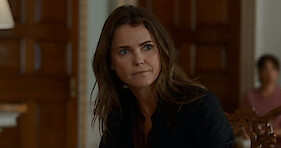 NEWSThe White House Called: ‘The Diplomat’ Season 2 Is OfficialMay 1
NEWSThe White House Called: ‘The Diplomat’ Season 2 Is OfficialMay 1 -
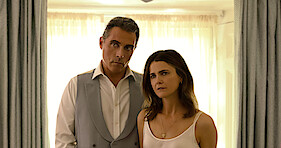 WHO’S WHOMeet the Political Power Players in ‘The Diplomat’Apr 28
WHO’S WHOMeet the Political Power Players in ‘The Diplomat’Apr 28 -
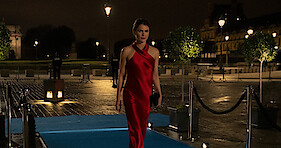 EXPLAINERLet’s Unravel that Explosive ‘The Diplomat’ EndingApr 20
EXPLAINERLet’s Unravel that Explosive ‘The Diplomat’ EndingApr 20 -
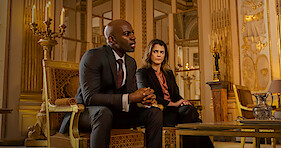 PREVIOUSLY ONWhat Happens in ‘The Diplomat’ Episode 8?Apr 20
PREVIOUSLY ONWhat Happens in ‘The Diplomat’ Episode 8?Apr 20
So making that life adjustment, I think has its own sort of delight and horror, that to me married really nicely with the idea of talking about what the U.S. is in the world in the way that we did on Homeland, but obviously not exactly in the same way.
And there was one last inciting incident for the show, which was on Homeland we would do something called spy camp. At the beginning of every season we would spend a week in Washington, D.C., and this unbelievable parade of experts would come through from the political world and foreign policy and journalists and generals and ambassadors.
And when the first [ambassador] came in and sat down and talked to us, she just blew my mind. She looked so polite and unassuming, and if you had told me she was a librarian, I would’ve believed you. And then she starts talking about what her career has looked like and it’s just breathtaking. The stories are breathtaking and very action packed and very Carrie Mathison, and nobody knows about them. Those jobs, when done right, are completely invisible. And all we ever hear about it is like, “Oh, ambassadors, they go and they drink champagne in fancy places,” and it’s so much that’s hidden. And not necessarily hidden, but has not before been very much of interest in the public. And I just felt like this woman is a superhero in a pantsuit. She’s running around saving the world and dodging bullets and doing it all with a china teacup in her hand. And I just didn’t see it coming. And I thought, “Well, that’s a possibility.”
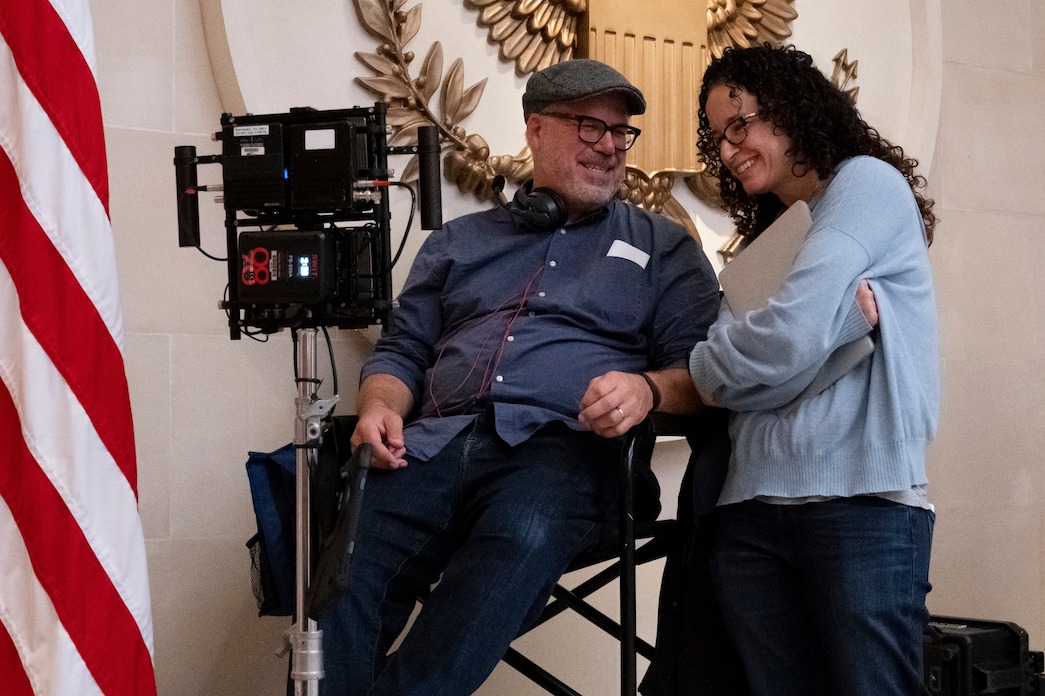
Alex Bailey/Netflix
You make a point of having Mr. Wyler explain the difference between the two kinds of ambassadors: “We are more the British style of ambassadors than American ambassadors.” Was that something that you felt needed to be included up front?
It was important to me. I feel a certain responsibility to the people who were generous enough to talk to me about their life and to this, what I consider to be a truly heroic world of people who do this work. I wanted to look at, what does it mean to spend your life this way? Because also, a lot of the pieces on the relationship side that I wanted to explore were way more germane to somebody who is a career foreign service officer.
And then, just the intensity of the work and the pivotal nature of what people are doing when they’re kind of flying into a crisis zone or a place that’s about to break out into war, it’s in one and it needs help ending it. That was the kind of subject matter that I wanted to focus on, and it seemed meaningful to me to make it clear why some are like that and why some are kind of the stereotype that we have in our minds.
Could you tell me about the origin of Kate Wyler’s character?
I grew up in a cohort where we didn’t necessarily expect that [women could have big leadership roles]. There weren’t a lot of people who were sort of in those leadership positions and maybe we knew that we wanted to be, but it wasn’t obvious that we were going to get there. And so growing up as a professional in a slightly different paradigm, and then reaching a leadership position and noticing what it feels like when you’ve been working towards something for X decades, and then you’re there, and how do you feel in that position. And I think Kate came out of my interest in portraying what that feels like on the inside. She’s a little bit of a raw nerve. She is kind of wearing on her sleeve what I think many people are feeling inside all the time. You’re doing something and it’s important, but you’re concerned that you stepped in chewing gum on the way in and there’s chewing gum on your shoe and is there a time in this very long meeting that you’re in that you’ll be able to look at the bottom of your shoe?
We are all so terrifically tragically human on the inside of whatever image of expertise and calm and control that we have. And diplomacy seemed like such a great environment and taking somebody who’s kind of been frontline material and putting them in a palace and in a more presentational role, it just seemed like such a perfect opportunity to play out what that feels like on the inside all the time.
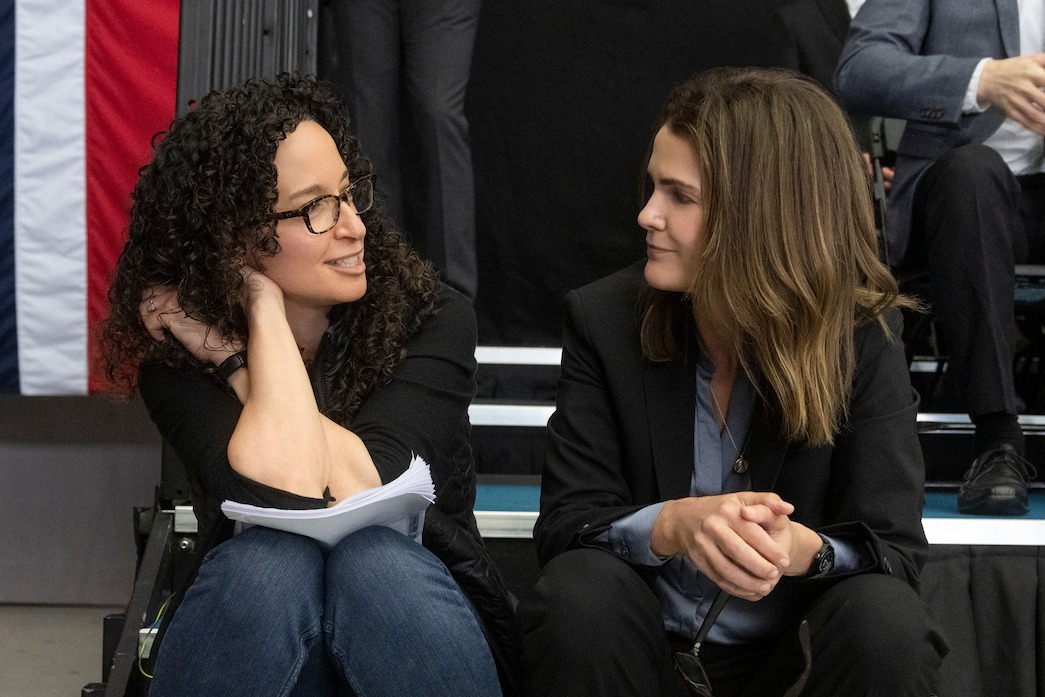
Alex Bailey/Netflix
At what point did Keri Russell get cast in the role? Was Kate Wyler fully formed in your mind as a character before you cast the role?
Look, she was sort of the dream version, and I didn’t think that we would be able to get her, and I was really excited when she agreed to be a part of this. I didn’t have any idea how much Kate she is, because I haven’t seen that. Particularly in The Americans, she’s just this laser of power and grace. She seems so poised. It comes naturally to her, and she is so generous with her own humanity and vulnerability that she’s sort of willing to be in that place with the character all the time and just go all the way there.
So when the character was first forming, I knew that I wanted her to be in this world that’s sort of always on the precipice between intense drama and comedy, and you never know where the tone is going to land — is that stuff going to work? It’s great to say, ‘Oh, I want to do all tones together, but it’s hard to land that, and it turns out she’s really, really, really good at it. And so I was able to push much farther in that direction than I might have because she’ll just go all the way there and she’s really good at making those moments sing. She’s an incredible comedian, like classic, tragic clown kind of ability to meet the world with emotional vulnerability and an incredible physical vocabulary. She’s a dancer, and so the physicality of comedy is something that she’s got a lot of.
Kate is a little bit of a cross between her characters in The Americans — this poised superhero — and Felicity. There’s also a bit of her character from the short-lived Mitchell Hurwitz show [Running Wilde], which was a comedy. And she was great in that.
And Waitress! Very funny. A very, very funny performance and smart. It’s great. And it’s great to see all of that come together in one character.
That relationship between the two Wylers, the two ambassadors, is such an important part of the show. Was that a very long process to find the right pairing?
You make a dream list and they were both at the top of the top of those lists, and we kind of lucked out there. I mean, I knew that we loved her for Kate, and I knew that we loved [Rufus Sewell] for Hal. It’s very difficult to tell what chemistry is going to be like between two people when you get them together. And so I felt like that was just a gamble because you never know. I did feel like both of them were skilled enough that they were going to build a beautiful relationship, but there’s no way that I could have anticipated the amount of joy that is on the stage when they’re working together. It makes it more fun to film over very long days. But it also just builds in that sense of, oh, they’ve known each other for a long time and they really, really love each other. So you can then do the, “I don’t ever want to see you again,” because there’s so much of a bond.
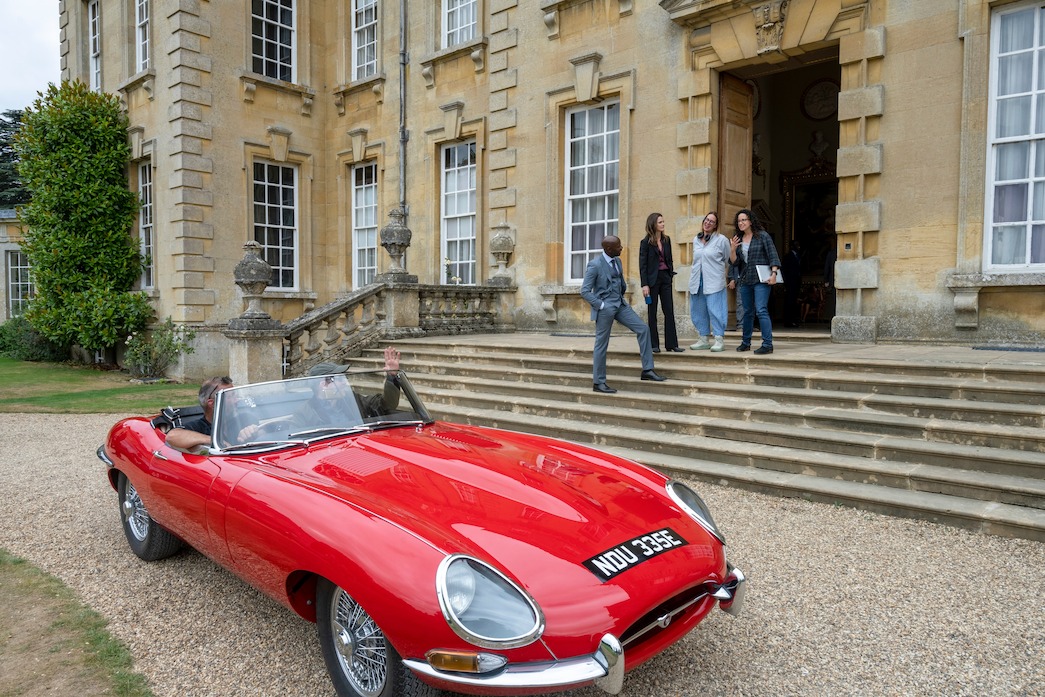
Alex Bailey/Netflix
One of my favorite moments is when Kate is talking to [British Foreign Secretary] Dennison and he doesn’t understand something about the way that she reacts to information that he gives her. And she says, “You were never staff, were you?” And he doesn’t even understand the question at first, the idea of being staff. And she’s like, “No, of course. You went from leadership position to leadership position.” I thought, here’s Debora Cahn, showrunner, creator, head writer after having started as—a term you once told me years ago—a “baby writer,” a writing room assistant and then rising up the ranks. How much of that moment is coming straight from your life?
Oh, I think I would have to say all of it. I had the good fortune of going from one well-established, extremely successful show to another and working with people who were successful in the field. I felt like I was always in a position to sort of enjoy what I could bring to it without having the crushing responsibility of the buck stopping with me. It stopped with Aaron [Sorkin] and then it stopped with John Wells, and then it stopped with Shonda [Rhimes], and then it stopped with Alex Gansa and Terry Winter. My part was often hard work, but I always had this escape valve of, it was serving somebody else’s vision, so they would make sure that it worked.
And I ended up, after 10 years in LA, moving to New York, which meant that I started working remotely at a time when that wasn’t something people did. Now it seems, like, totally normal, but I was a telecommuter kind of before people did that in the television industry. And because of that, I was working part-time, I was having kids, I was raising kids. It was easy for me to continue to be on staff and harder to be a showrunner. And I was fine with that because I actually really liked the job that I had. So I watched a lot of people and I watched a lot of my peers and people that I came up with become showrunners before I did it. And so I sort of studied it a lot, and I studied what was different about what they were doing and what I was doing, and was excited to do it at some point, but wasn’t rushing headlong into it.
And I did do a lot of thinking about it before I did it, which was really helpful and gave me a leg up, but in a lot of ways, I still went in and made every mistake that I swore that I never would. So you can prepare quite a lot and you’re still never going to be prepared.
Well, that makes me wonder about the sort of people you are now in charge of surrounding yourself with once you have the brunt of that crushing responsibility. One of the people I noticed right away in the writing staff was Peter Noah, who I know you wrote with on The West Wing.
Yeah. Peter and Eli [Attie] are also working on the show. You bring in the smartest, best people you can find. I love Peter’s writing and I loved working with him on The West Wing. We have wanted to do something together since then, and it was great to have an opportunity to work with him again and also to just be able to lean on his vast wealth of knowledge and experience in the industry. He understands many, many of the different dimensions in the process, so it’s an absolute luxury to have him.
And have you stayed friends since? I mean, it was 17 years ago when The West Wing ended. Have you and Peter Noah stayed friends throughout that whole time?
We have. I mean, you make relationships along the way, and of course you want to work with the people who you enjoy and you respect. Often the timing just doesn’t work out. People are working and in this one window of time when somebody’s ready to start something new, are your handful of dream choices available? And the stars kind of aligned and made that possible, for which I was very, very grateful.
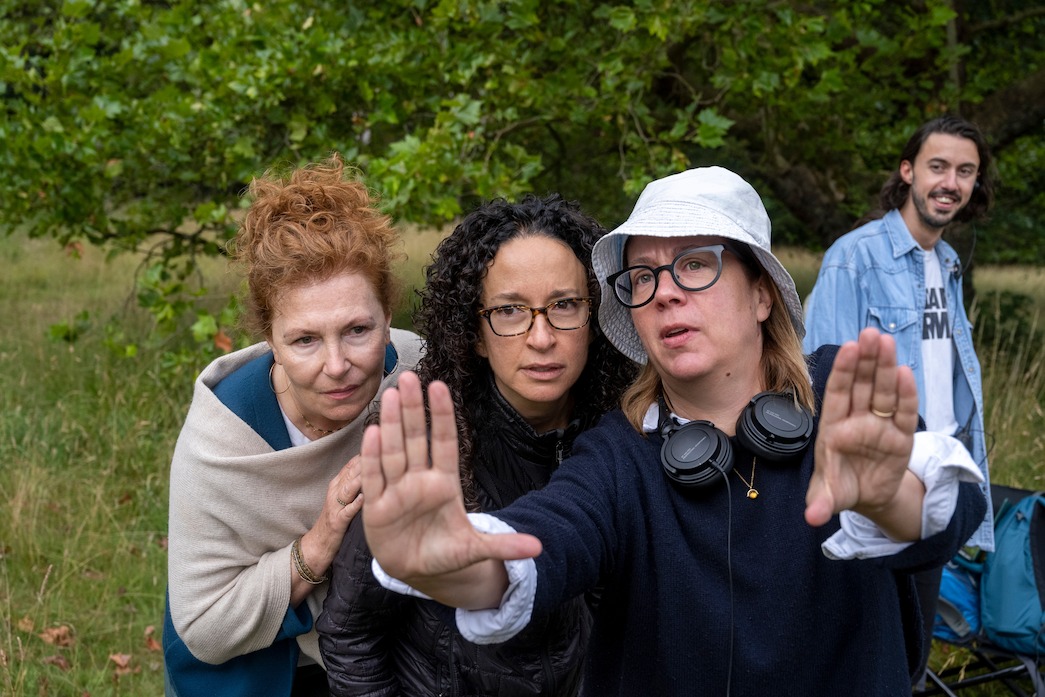
Alex Bailey/Netflix
I want to remind you of a story you told me when I interviewed you before about The West Wing, about Peter Noah. You said, “Peter Noah is one of the writers who came in in season five, and we got to be good friends and he’d been in the business for a long time and he leaned over to me one day in the writer’s room and he said, ‘This is the best experience you’ll ever have in your career.’ And it was my first job, and it was the second year of my first job. And I was like, ‘Fuck you, man. I’m going to have a lot of great experiences in this industry. This is great, and I know it’s great, but other good things will come.'” So who was right?
He was right for many, many, many, many years. Many years he was right. And then, two years ago he was wrong.
You know, there’s so much swearing in the show that characters actually talk about how much Kate swears.
There is a bunch of it. We’re spending a lot of time looking at people whose language is their most powerful tool and the tool which they are expected to use the most. And the piece that I’m interested in is who you are on stage and who you are off stage, and your ability to manage those two things seamlessly. And more importantly, where are the cracks in it on both sides? So it’s a pretty quick way of communicating to both an audience and to people around the characters. And their familiarity with expressing a lot of emotion in language, which one does when one’s swearing, and the ability to not bring your emotion out onto the stage with you.
I think Kate feels that her emotions are always on the outside, and they definitely are in her speech, and watching her struggle to make the transition into mastering that, marshaling that into something that allows her to do her job in this much, much, much more front-facing place. She’s talking to the President, she’s talking to the Secretary of State, to powerful figures who need a lot of information quickly about important things, and seeing her grappling with having to pull herself together into those moments, the less controlled and the less marshaled she is in her resting state, the more difficult that transition is, and for me, more interesting to watch.
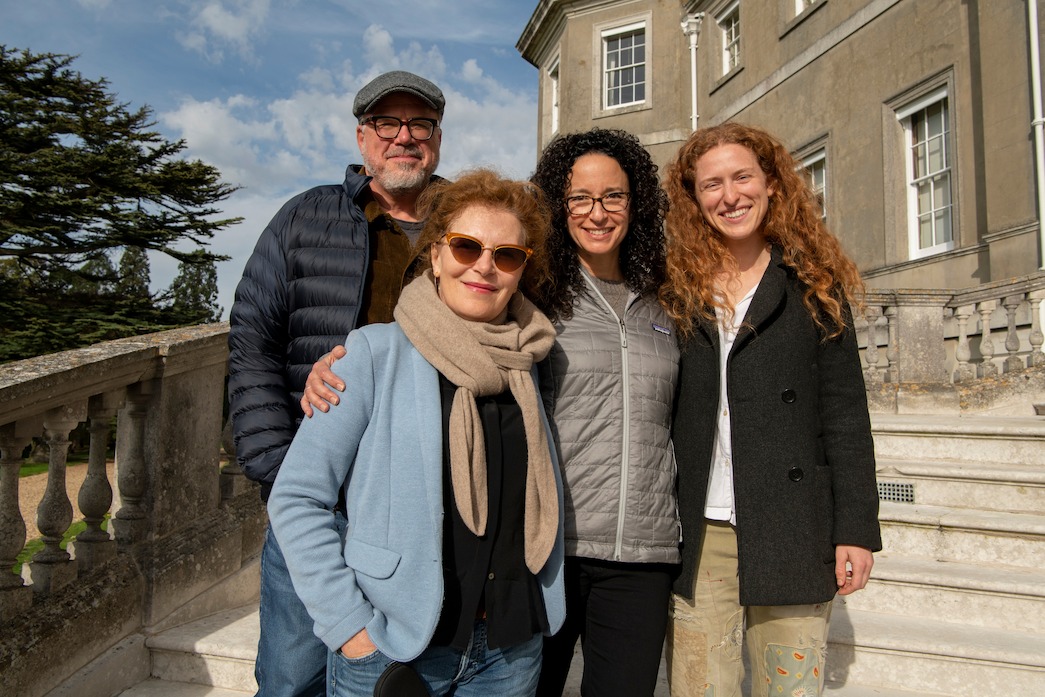
Alex Bailey/Netflix
Toward the end of the show, Hal Wyler makes a pivotal speech about the need for diplomacy. And the effect that it has on the audience is important also to the plot. That’s a tricky thing to do. You have to write a speech that, plot-wise, has to impress people, which means that you actually have to write a speech that at least could reasonably impress people, which is a different job than writing television. What was the process of writing that speech?
So I’m going to give you a couple of answers to that question. One is going to be about one of our consultants, a guy named Jonathan Powell, who wrote a book called Talking to Terrorists, is an incredible diplomat, negotiator, conflict resolution specialist; he was part of negotiating the Good Friday Agreements and goes kind of from crisis zone to crisis zone, every massive hotspot in the world that you can think of and is part of the solution building crack team. So he’s really impressive.
The other answer is Anna Hagen who wrote the speech, and I didn’t.
Anna Hagen started as my assistant and then she became my researcher, and then she became a writer on the show. She’s exactly in her career where I was when I started writing for The West Wing. And when you were talking about, what does it mean to build a staff, it turns out you want Peter Noah and Eli Attie and people who have done it for a long time and are really smart and are really amazing writers and storytellers, and then you also want somebody who’s kind of coming in fresh with a ton of talent and able to match your voice, which it’s in some ways easier for a younger writer to do. So she was able to do that and became such a key piece of the show and so much of her voice is in the show, and it is an incredible luxury to have somebody like that as a partner in the writing of this. So yeah, you’re going to have to interview her, no doubt.
And I just love the moment when Kate has the yogurt stain on her pants, because I also remember CJ having a coffee stain on her blouse in a West Wing episode you wrote, “Drought Conditions.” and I thought, “Hmm, does Deb spill a lot of food on herself in meetings?”
Yes! [laughing] The answer to the question is yes.
